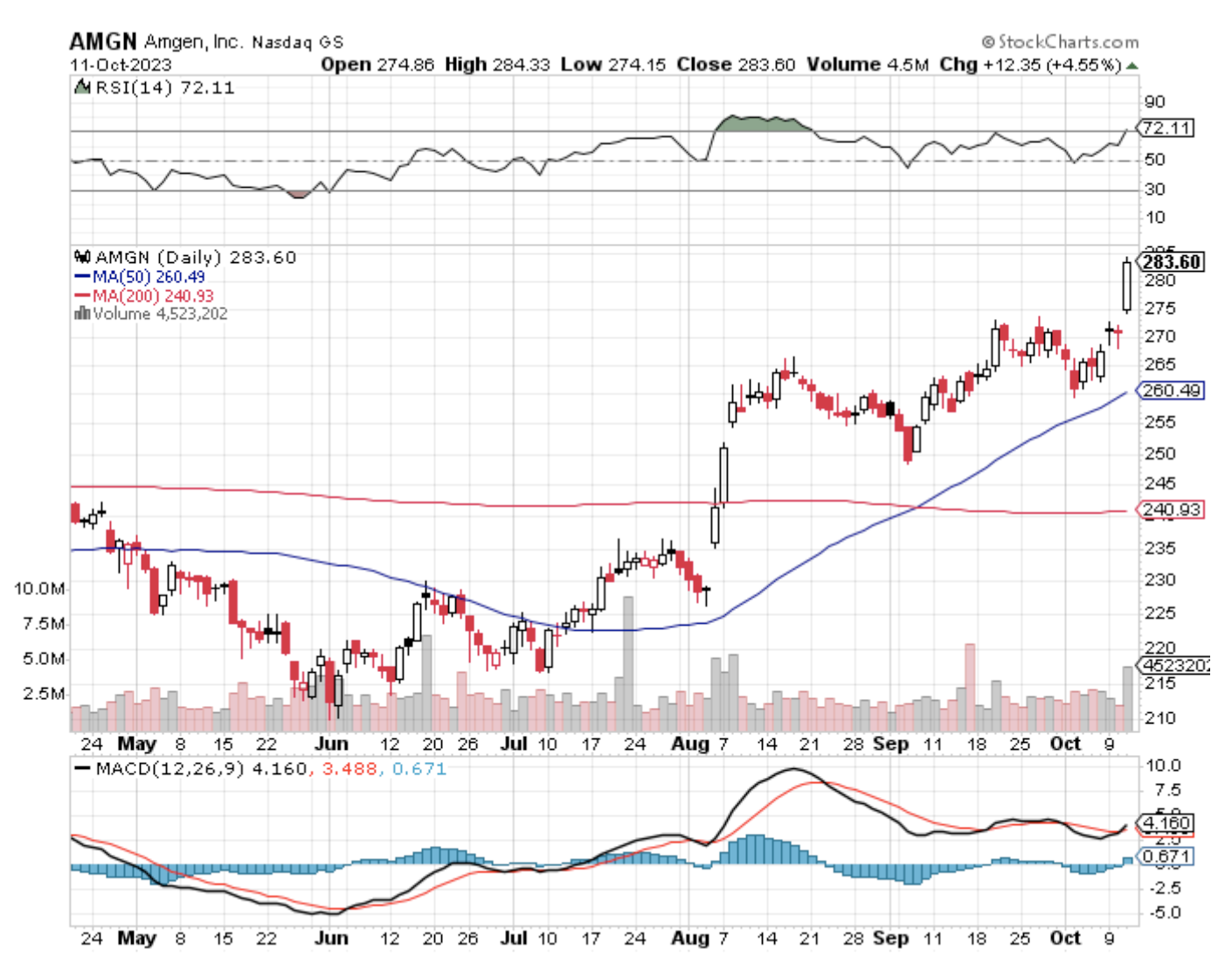An Excellent Blueprint For Success
Dividends, the consistent source of passive income, have long anchored many investment portfolios. For stock market investors, particularly those with an eye on the biotechnology and healthcare sector, dividends offer both stability and potential growth.
However, the landscape of dividends is not without its pitfalls. A significant concern for investors is when a company decides to cut or suspend these payouts. So, how can one navigate this challenge? The key is to pinpoint corporations that not only offer dividends but are also poised for sustained growth.
This brings us to a prime example: Amgen (AMGN).
Amgen, in recent times, has grappled with challenges that are not uncommon in the pharmaceutical world. The competitive landscape has chipped away at the market share of some of its flagship drugs, leading to a stagnation in revenue growth.
New therapies, like the asthma treatment Tezspire, have received approval but have yet to be the sales catalysts the company might have hoped for. However, it's crucial to understand that in the pharmaceutical industry, stagnation is not a death sentence but a call to innovate and adapt.
Recognizing the need for strategic growth, Amgen unveiled its plans to acquire Horizon Therapeutics for $28.3 billion in cash.
Horizon, specializing in rare autoimmune diseases, offers a rich pipeline of over 20 programs and an array of approved products. This move is not just an expansion; it's a strategic enhancement of Amgen's portfolio.
After some initial regulatory challenges, the acquisition was sealed on October 6, 2023, at $116.50 per share in cash, amounting to an equity value of $27.8 billion.
Now, let's delve into the numbers. Horizon reported a revenue of $3.6 billion for the year ending June 30, 2023, and an operating income of $513 million. When we juxtapose these figures against Amgen's performance, projections suggest that Horizon could amplify Amgen's annual revenue by a notable 12% to 14%.
As of October 9, 2023, Amgen's equity value stood at approximately $143 billion, translating to an equity value to an annual revenue ratio of 5.3x. In comparison, Horizon's ratio is 7.9x.
For the discerning investor, these figures hint at Amgen's belief in Horizon's potential to be a significant revenue generator.
But Amgen's story doesn't end with Horizon. The company's resilience is evident in its global strategies.
The inclusion of Repatha on China’s National Reimbursement Drug List as of January 1, 2022, bore fruit, with sales jumping from $388 million in the first quarter of this year to $424 million by the second quarter.
Even drugs like Enbrel and XGEVA, which faced concerns about increased competition, have shown promising sales trajectories. By the second quarter of 2023, Amgen's total product sales touched $6,683 million, a 14% leap from the previous quarter.
With a global footprint and encouraging data for drugs like Tarlatamab and LUMAKRAS, Amgen's revenue projections of $26.6 billion to $27.4 billion for 2023 seem well within reach.
Diversification is another feather in Amgen's cap. Beyond acquisitions, the company is nurturing a robust pipeline with numerous programs in development.
Venturing into the biosimilar market, Amgen is crafting alternatives to blockbuster drugs to compete with the more expensive options offered by the likes of Bristol Myers Squibb (BMY) and AbbVie (ABBV). In an era where affordable healthcare is not just a demand but a necessity, this strategy could further cement Amgen's position in the market.
In the intricate world of biotech investing, adaptability is the rhythm, and forward-thinking is the step. Challenges, while inevitable, are also opportunities in disguise. Strategic decisions, exemplified by Amgen's acquisition of Horizon, can chart the path for sustained growth.
For investors, the numbers are compelling. A dividend growth of 61% over five years, a competitive yield of 3.26%, and a forward P/E ratio of 14.3 paint a picture of stability and promise.
Ultimately, Amgen's journey in the biotech sector underscores the significance of adaptability, innovation, and strategic growth. In an industry marked by rapid changes and high stakes, the company emerges as a symbol of resilience.
For investors with an eye on biotechnology and healthcare, Amgen offers not just dividends but a vision of sustained growth and stability, making it an investment worth considering. I suggest you buy the dip.


